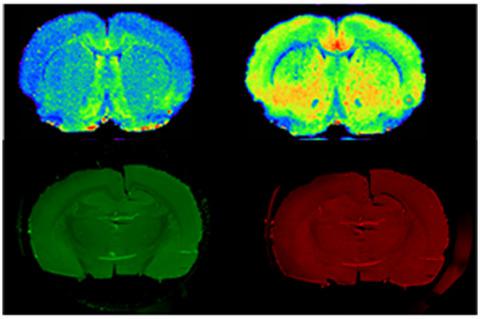Our official English website, www.x-mol.net, welcomes your feedback! (Note: you will need to create a separate account there.)
Metabotropic glutamate 2,3 receptor stimulation desensitizes agonist activation of G‐protein signaling and alters transcription regulators in mesocorticolimbic brain regions
SYNAPSE ( IF 2.3 ) Pub Date : 2020-10-06 , DOI: 10.1002/syn.22190 Carolina Burgos-Aguilar 1 , Mark J Ferris 1 , Lacey L Sexton 1 , Haiguo Sun 1 , Ruoyu Xiao 1 , Rong Chen 1 , Steven R Childers 1 , Allyn C Howlett 1
SYNAPSE ( IF 2.3 ) Pub Date : 2020-10-06 , DOI: 10.1002/syn.22190 Carolina Burgos-Aguilar 1 , Mark J Ferris 1 , Lacey L Sexton 1 , Haiguo Sun 1 , Ruoyu Xiao 1 , Rong Chen 1 , Steven R Childers 1 , Allyn C Howlett 1
Affiliation

|
Metabotropic glutamate (mGlu) receptors are regulators of glutamate release and targets for development of therapies for hyperactive glutamatergic signaling. However, the effects of long‐term stimulation of mGlu receptors on cellular signaling in the brain have not been described. This study investigated the effects of 2‐day and 14‐day osmotic mini‐pump administration of the mGlu2,3 agonist LY379268 (3.0 mg kg−1 day−1) to rats on receptor‐mediated G‐protein activation and signaling in mesocorticolimbic regions in rat brain sections. A significant reduction in LY379268‐stimulated [35S]GTPγS binding was observed in the 14‐day group in some cortical regions, prefrontal cortex, nucleus accumbens, and ventral pallidum. The 14‐day LY379268 treatment group exhibited mGlu2 mRNA levels significantly lower in hippocampus, nucleus accumbens, caudate, and ventral pallidum. In both 2‐day and 14‐day treatment groups immunodetectable phosphorylated cAMP Response Element‐Binding protein (CREB) was significantly reduced across all brain regions. In the 2‐day group, we observed significantly lower immunodetectable CREB protein across all brain regions, which was subsequently increased in the 14‐day group but failed to achieve control values. Neither immunodetectable extracellular signal‐regulated kinase (ERK) protein nor phosphorylated ERK from 2‐day or 14‐day treatment groups differed significantly from control across all brain regions. However, the ratio of phosphorylated ERK to total ERK protein was significantly greater in the 14‐day treatment group compared with the control. These results identify compensatory changes to mGlu2,3 signal transduction in rat brains after chronic systemic administration of agonist, which could be predictive of the mechanism of action in human pharmacotherapies.
中文翻译:

代谢型谷氨酸 2,3 受体刺激使 G 蛋白信号的激动剂激活脱敏并改变中脑边缘脑区的转录调节因子
代谢型谷氨酸 (mGlu) 受体是谷氨酸释放的调节剂,也是开发用于过度活跃的谷氨酸能信号传导疗法的目标。然而,尚未描述长期刺激 mGlu 受体对大脑细胞信号传导的影响。本研究调查了 mGlu2,3 激动剂 LY379268(3.0 mg kg -1 day -1 )对大鼠的 2 天和 14 天渗透性微型泵给药对中皮质边缘区受体介导的 G 蛋白活化和信号传导的影响在大鼠脑切片中。LY379268 刺激的显着减少 [ 35在 14 天组中,在某些皮质区域、前额叶皮层、伏隔核和腹侧苍白球中观察到 S]GTPγS 结合。14 天 LY379268 治疗组在海马、伏隔核、尾状核和苍白球腹侧的 mGlu2 mRNA 水平显着降低。在 2 天和 14 天治疗组中,所有大脑区域的免疫可检测磷酸化 cAMP 反应元件结合蛋白 (CREB) 均显着降低。在 2 天组中,我们观察到所有大脑区域的免疫可检测 CREB 蛋白显着降低,随后在 14 天组中增加,但未能达到控制值。2 天或 14 天治疗组的免疫可检测细胞外信号调节激酶 (ERK) 蛋白和磷酸化 ERK 与所有脑区的对照组均无显着差异。然而,与对照组相比,14 天治疗组的磷酸化 ERK 与总 ERK 蛋白的比例显着增加。这些结果确定了慢性全身给药激动剂后大鼠大脑中 mGlu2,3 信号转导的补偿性变化,这可以预测人类药物疗法中的作用机制。
更新日期:2020-10-06
中文翻译:

代谢型谷氨酸 2,3 受体刺激使 G 蛋白信号的激动剂激活脱敏并改变中脑边缘脑区的转录调节因子
代谢型谷氨酸 (mGlu) 受体是谷氨酸释放的调节剂,也是开发用于过度活跃的谷氨酸能信号传导疗法的目标。然而,尚未描述长期刺激 mGlu 受体对大脑细胞信号传导的影响。本研究调查了 mGlu2,3 激动剂 LY379268(3.0 mg kg -1 day -1 )对大鼠的 2 天和 14 天渗透性微型泵给药对中皮质边缘区受体介导的 G 蛋白活化和信号传导的影响在大鼠脑切片中。LY379268 刺激的显着减少 [ 35在 14 天组中,在某些皮质区域、前额叶皮层、伏隔核和腹侧苍白球中观察到 S]GTPγS 结合。14 天 LY379268 治疗组在海马、伏隔核、尾状核和苍白球腹侧的 mGlu2 mRNA 水平显着降低。在 2 天和 14 天治疗组中,所有大脑区域的免疫可检测磷酸化 cAMP 反应元件结合蛋白 (CREB) 均显着降低。在 2 天组中,我们观察到所有大脑区域的免疫可检测 CREB 蛋白显着降低,随后在 14 天组中增加,但未能达到控制值。2 天或 14 天治疗组的免疫可检测细胞外信号调节激酶 (ERK) 蛋白和磷酸化 ERK 与所有脑区的对照组均无显着差异。然而,与对照组相比,14 天治疗组的磷酸化 ERK 与总 ERK 蛋白的比例显着增加。这些结果确定了慢性全身给药激动剂后大鼠大脑中 mGlu2,3 信号转导的补偿性变化,这可以预测人类药物疗法中的作用机制。



























 京公网安备 11010802027423号
京公网安备 11010802027423号